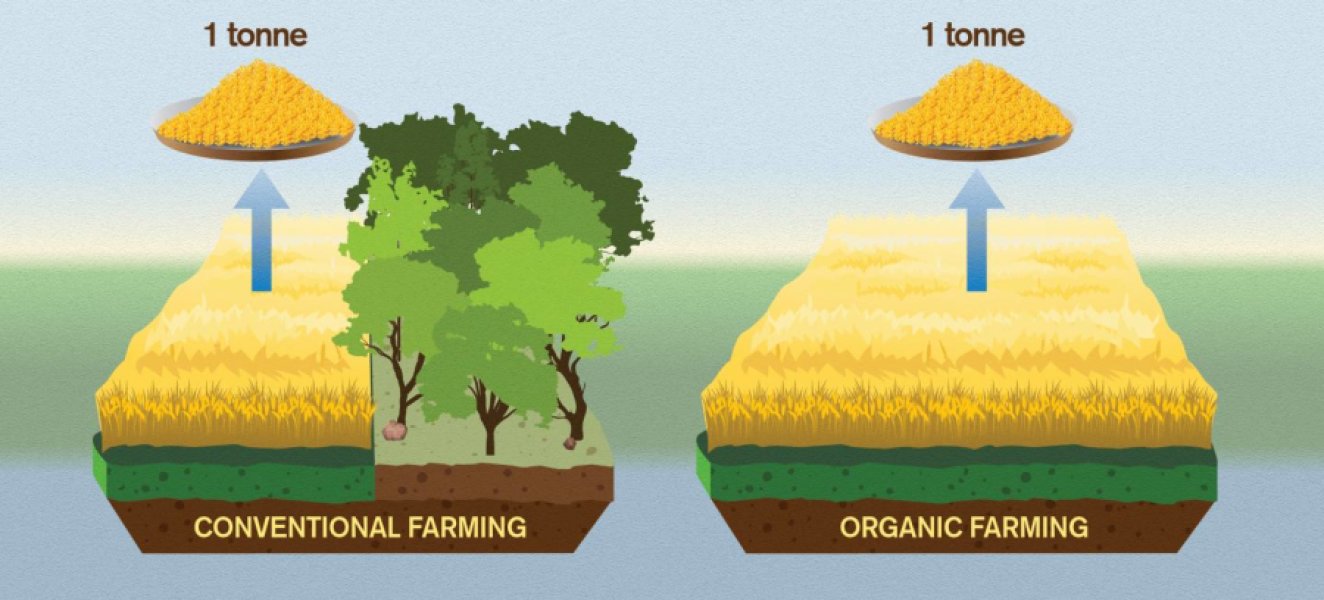Organically farmed food has a bigger climate impact than conventionally farmed food, due to the greater areas of land required. This is the finding of a new international study involving Chalmers University of Technology, Sweden, published in the journal Nature.
The researchers developed a new method for assessing the climate impact from land-use, and used this, along with other methods, to compare organic and conventional food production. The results show that organic food can result in much greater emissions.
Study shows that organic peas, farmed in Sweden, have around a 50 percent bigger climate impact than conventionally farmed peas. For some foodstuffs, there is an even bigger difference for example, with organic Swedish winter wheat the difference is closer to 70 percent.
The reason why organic food is so much worse for the climate is that the yields per hectare are much lower, primarily because fertilisers are not used. To produce the same amount of organic food, you therefore need a much bigger area of land.
The ground-breaking aspect of the new study is the conclusion that this difference in land usage results in organic food causing a much larger climate impact.
The greater land-use in organic farming leads indirectly to higher carbon dioxide emissions, thanks to deforestation. The world's food production is governed by international trade, so how we farm in Sweden influences deforestation in the tropics. If we use more land for the same amount of food, we contribute indirectly to bigger deforestation elsewhere in the world.
Even organic meat and dairy products are from a climate point of view worse than their conventionally produced equivalents. Because organic meat and milk production uses organic feed-stock, it also requires more land than conventional production. This means that the findings on organic wheat and peas in principle also apply to meat and milk products. We have not done any specific calculations on meat and milk, however, and have no concrete examples of this in the article.
A new metric: Carbon Opportunity Cost
The researchers used a new metric, which they call "Carbon Opportunity Cost," to evaluate the effect of greater land-use contributing to higher carbon dioxide emissions from deforestation. This metric takes into account the amount of carbon that is stored in forests, and thus released as carbon dioxide as an effect of deforestation. The study is among the first in the world to make use of this metric.
"The fact that more land use leads to greater climate impact has not often been taken into account in earlier comparisons between organic and conventional food.
This is a big oversight, because, as our study shows, this effect can be many times bigger than the greenhouse gas effects, which are normally included. It is also serious because today in Sweden, we have politicians whose goal is to increase production of organic food. If that goal is implemented, the climate influence from Swedish food production will probably increase a lot."
So why have earlier studies not taken into account land-use and its relationship to carbon dioxide emissions?
"There are surely many reasons. An important explanation, I think, is simply an earlier lack of good, easily applicable methods for measuring the effect. Our new method of measurement allows us to make broad environmental comparisons, with relative ease,
More on: The conflict between different environmental goals
In organic farming, no fertilisers are used. The goal is to use resources like energy, land and water in a long-term, sustainable way. Crops are primarily nurtured through nutrients present in the soil. The main aims are greater biological diversity and a balance between animal and plant sustainability. Only naturally derived pesticides are used.
The arguments for organic food focus on consumers' health, animal welfare, and different aspects of environmental policy. There is good justification for these arguments, but at the same time, there is a lack of scientific evidence to show that organic food is in general healthier and more environmentally friendly than conventionally farmed food, according to the National Food Administration of Sweden and others. The variation between farms is big, with the interpretation differing depending on what environmental goals one prioritises. At the same time, current analysis methods are unable to fully capture all aspects.
The authors of the study now claim that organically farmed food is worse for the climate, due to bigger land use. For this argument they use statistics from the Swedish Board of Agriculture on the total production in Sweden, and the yields per hectare for organic versus conventional farming for the years 2013-2015.
More on biofuels: "The investment in biofuels increases carbon dioxide emissions"
Today's major investments in biofuels are also harmful to the climate because they require large areas of land suitable for crop cultivation, and thus according to the same logic increase deforestation globally, the researchers in the same study argue.
For all common biofuels (ethanol from wheat, sugar cane and corn, as well as biodiesel from palm oil, rapeseed and soya), the carbon dioxide cost is greater than the emissions from fossil fuel and diesel, the study shows. Biofuels from waste and by-products do not have this effect, but their potential is small, the researchers say.
All biofuels made from arable crops have such high emissions that they cannot be called climate-smart, according to the researchers, who present the results on biofuels in an opened in the Swedish Newspaper Dagens Nyheter: "The investment in biofuels increases carbon dioxide emissions."
